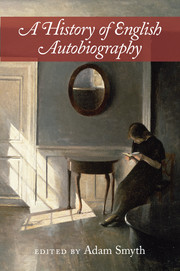Book contents
- Frontmatter
- Dedication
- Contents
- List of contributors
- 1 Introduction: The range, limits, and potentials of the form
- PART 1 AUTOBIOGRAPHY BEFORE ‘AUTOBIOGRAPHY’ (CA. 1300–1700)
- PART 2 RELIGION, GENDER, THINGS (CA. 1700–1800)
- PART 3 THE MANY NINETEENTH CENTURIES (CA. 1800–1900)
- PART 4 RELATIONAL LIVES AND FORMS OF REMEMBERING (CA. 1890–1930)
- PART 5 KINDS OF COMMUNITY (CA. 1930-CONTEMPORARY)
- 23 Poetry and autobiography in the 1930s: Auden, Isherwood, MacNeice, Spender
- 24 Documenting lives: Mass Observation, women's diaries, and everyday modernity
- 25 Postcolonial autobiography in English: The example of Trinidad
- 26 Around 2000: Memoir as literature
- 27 Illness narratives
- 28 Breaking the pact: Contemporary autobiographical diversions
- 29 The machines that write us: Social media and the evolution of the autobiographical impulse
- Index
- References
25 - Postcolonial autobiography in English: The example of Trinidad
from PART 5 - KINDS OF COMMUNITY (CA. 1930-CONTEMPORARY)
Published online by Cambridge University Press: 05 March 2016
- Frontmatter
- Dedication
- Contents
- List of contributors
- 1 Introduction: The range, limits, and potentials of the form
- PART 1 AUTOBIOGRAPHY BEFORE ‘AUTOBIOGRAPHY’ (CA. 1300–1700)
- PART 2 RELIGION, GENDER, THINGS (CA. 1700–1800)
- PART 3 THE MANY NINETEENTH CENTURIES (CA. 1800–1900)
- PART 4 RELATIONAL LIVES AND FORMS OF REMEMBERING (CA. 1890–1930)
- PART 5 KINDS OF COMMUNITY (CA. 1930-CONTEMPORARY)
- 23 Poetry and autobiography in the 1930s: Auden, Isherwood, MacNeice, Spender
- 24 Documenting lives: Mass Observation, women's diaries, and everyday modernity
- 25 Postcolonial autobiography in English: The example of Trinidad
- 26 Around 2000: Memoir as literature
- 27 Illness narratives
- 28 Breaking the pact: Contemporary autobiographical diversions
- 29 The machines that write us: Social media and the evolution of the autobiographical impulse
- Index
- References
Summary
Introduction
The roots of postcolonial autobiography in English lie in the eighteenth century, in texts synthesising spiritual autobiography and travelogue – notably Gronniasaw Ukawsaw's A Narrative (ca. 1767) and Olaudah Equiano's Interesting Narrative (1789). Not all such texts were ‘slave narratives’, under which rubric they are commonly studied, particularly in the United States. For example, Sake Dean Mohamed's Travels (1794) is a similar mix of autobiography and travelogue by the first man to open an Indian restaurant in Britain and who introduced fashionable society to shampoo. In the nineteenth century, colonised subjects began to produce autobiography across the British Empire, attesting to the rapid consolidation of English as its lingua franca and of colonial education. Mary Seacole's Wonderful Adventures (1857) is an early example of colonised women's appropriation of a form which was increasingly taken up (by both genders) in the twentieth century. The genre flourished as decolonisation unfolded between the 1940s–1960s, with politicians (for example Nehru, Nkrumah, Lee Kuan Yew) and ordinary citizens alike adapting it for the purposes of ‘national allegory’ – whereby the individual's trajectory towards ‘sovereign selfhood’ parallels his/her nation's towards political sovereignty. Autobiography is now a major strand of postcolonial literatures in English, reflecting both far-reaching changes in once-colonised societies (notably ever-expanding Anglophone middle classes) and a metropolitan readership's (not always benign) desire for ‘native informant’ testimonies about the non-Western world.
This chapter explores two instances of autobiography in English which engage with, and are shaped by, decolonisation and its aftermath. Each addresses perhaps the fundamental cultural/political question faced by postcolonial literatures more broadly – whether narrative forms derived from the coloniser's culture can be used without re-inscribing its (former) authority and prestige. As regards autobiography, the stakes are established by the celebrated critic Georges Gusdorf, for whom the genre has been historically implicated in, if not directly supportive of, colonial values and ideologies. Conversely, he insists that its subsequent deployment by (once-)colonised peoples can only be an imitative activity, demonstrating how successfully colonialism has reshaped their cultural identities (Gusdorf 1980, 29). Anticipating Gusdorf's arguments, M. K. Gandhi – author of perhaps the best-known Indian autobiography (albeit not written in English) – cautioned his fellow colonial subjects against embracing Western autobiography uncritically.
- Type
- Chapter
- Information
- A History of English Autobiography , pp. 359 - 373Publisher: Cambridge University PressPrint publication year: 2016



